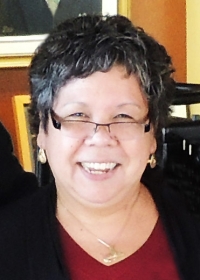
“Gilakas’la!”: “Welcome! Come with all that you are.” These are the words that greeted PROBUS members who came out to hear a fascinating presentation by Terri Mack on September 1st. Terri, a member of the Da’naxda’xw Awaetlala Nation Band, is an educator, author and founding member of Strong Nations Publishing in Nanaimo. Her greeting, a First Nations protocol, told us that she was on traditional territory and that she was asking for “permission to work and play on the land.” The greeting also acknowledged who she is (including her family) and that she is the voice of the whole family. For more information on protocol: https://www.ictinc.ca/first-nation-protocol-on-traditional-territory
Terri shared with us some of her background history. Her mother had been a full-blooded aboriginal; her father a Hungarian who, at age 16, had escaped Hungary in the 1956 Revolution. The marriage was not a happy one and Terri grew up with no real sense of identity. The mother lost her status through marriage also leaving Terri with no status after she was born. (Note: This loss of status applied only to the women, not the men at that time, but this has since been changed and women now can keep their status.)
She told us about some of the sad history of her people: The abrupt closure of the reservations, children taken from parents and placed in ‘residential’ schools or permanent foster homes, the shaming of the adults and of their turning to alcohol to alleviate their pain.
Terri also enlightened us about Reservation Status which gives the holder a number, a card and a tribal affiliation (A non-status Indian has no such affiliation.) A card gives the holder a medical plan (about equal to Social Assistance), and a dental plan. First Nations people pay income tax like everyone else, unless they work on a reservation and their employer is on the reserve. They also pay sales tax unless the purchase is made on the reserve. Those who live on reserves are not entitled to municipal services such as fire protection, library use, postal service or garbage pick-up; nor can they vote in municipal elections. From the INAC website: Over the years, there have been many rules for deciding who is eligible for registration as an Indian under the Indian Act.
This comes with its own set of problems however: Knowing which programs and policies apply to you may be difficult. Legislation varies across the ten provinces and three territories and so the the services available to Canadians in general and Aboriginal people in particular.
Hope for the future of these people of course is with the future generation and with strong, responsible leadership within the individual Bands. Terri ended her presentation with: “Most important of all are the children. We’re doing the best we can!”
For more information, Terri welcomed all of us to visit Strong Nations Publishing in Nanaimo https://www.strongnations.com/ She also highly recommended that we read the book : Peace Pipe Dreams, available at Strong Nations or from VIRL.


